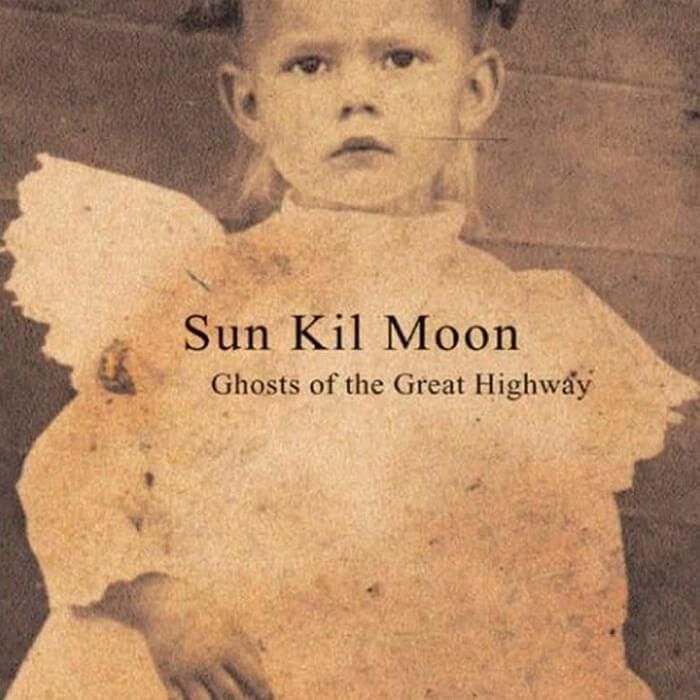Ghosts of the Great Highway by Sun Kil Moon (Review)

When you consider how much of my record collection and regular listening rotation is comprised of what some call “sad bastard” music, I suppose it might come as a surprise to learn that I’ve never been a huge follower of Mark Kozelek. I like what I’ve heard a great deal — I firmly believe “Katy Song” is the one of the greatest heartache songs ever written — but for whatever reason, I’ve never rushed out to buy any Red House Painters album or any of Kozelek’s solo recordings.
So I can’t quite explain what, exactly, led me to purchase Ghosts of the Great Highway, the debut album from Kozelek’s new band, Sun Kil Moon. It certainly wasn’t out of any sense of loyalty, or from a curiosity to see if/how Kozelek’s sound had changed or matured. (And even if it did, I in my ignorance would really have no context within which to judge such changes.) But whatever the case, I’m certainly glad I did buy this album.
Whatever heartbreak was famous for fuelling Kozelek’s earlier music is still evident on Ghosts of the Great Highway, but it never once comes off as trite, overwrought, or angst-ridden. Kozelek exhibits considerable skill and bravery, not just in his honesty in exposing youthful indiscretions and painful memories, but also in his restraint and gracefulness when writing about them.
“Carry Me Ohio,” one of the album’s finest tracks, drifts by on rolling guitars, effortless drumming, and sparse vibes, all of which perfectly accompany Kozelek’s gentle croon as he expresses regret for leaving an old lover (“Sorry for never going by your door/Never feeling love like that anymore”). There’s nary a bit of angst to be found anywhere — just graceful regret. “Last Tide” feels especially effortless, due in large part to the mandolin and haunting string filigrees that surface throughout the song.
The album’s most affecting moments are certainly its most languid and leisurely. But even when Kozelek and Co. feel the need to kick out the jams for a bit, as on “Salvador Sanchez” (one of several songs on the album where Kozelek expresses his love of boxing) or “Lily and Parrots,” it does little to disrupt the mood. Although the guitars might be turned up a bit louder and the distortion laid on a little more thickly, these songs still drift by — “Lily and Parrots,” in particular, coasts by on a playful guitar riff that almost sounds tongue-in-cheek.
The epic “Duk Koo Kim” (named after the South Korean boxer who died in 1982 after a bout with Ray Mancini, and whose death is referred to in the lyrics) is the album’s centerpiece, and is the best example of Kozelek’s rare talent. Over the course of 14 minutes, the song goes through several subtle changes — from the opening languid guitars, to the brushed drumming and rich acoustics of its mid section, to the gorgeous denouement that wraps things up — and yet it never once loses cohesion. Add to all of that Kozelek’s effortless falsetto and the longing in his lyrics (“Oh come to me once more my love/Show me love I’ve never known”), and it’s almost absurd how easy Kozelek makes it look.
The album winds down with “Si Paloma,” perhaps the album’s most effortless song, its flamenco guitars and playful mandolin exuding a contentment that’s a welcome relief from the longing that permeates the rest of the album; and “Pancho Villa,” a stripped down reworking of “Salvador Sanchez,” this time with acoustic guitars and sentimental strings. Both songs are fitting capstones to a gorgeous album.
Although I can’t explain just why I bought Ghosts of the Great Highway in the first place, I certainly have no problem putting into words why I keep listening to it time and again. It’s remarkable how easy it is to slip back into this album, even after having not heard it for quite some time. My favorite parts are just as lovely as I remembered, and the emotional warmth of the album still tugs on the same heartstrings.
While “comfortable” might not always be a choice word when describing an album, I find it quite fitting for Ghosts of the Great Highway. It’s comfortable in the sense of being solid, of being self-assured and sincere. Songwriting this confident — so confident it’s willing to trust the listener with restraint and subtlety, not to mention honesty — is a rare thing, and is definitely worth treasuring.